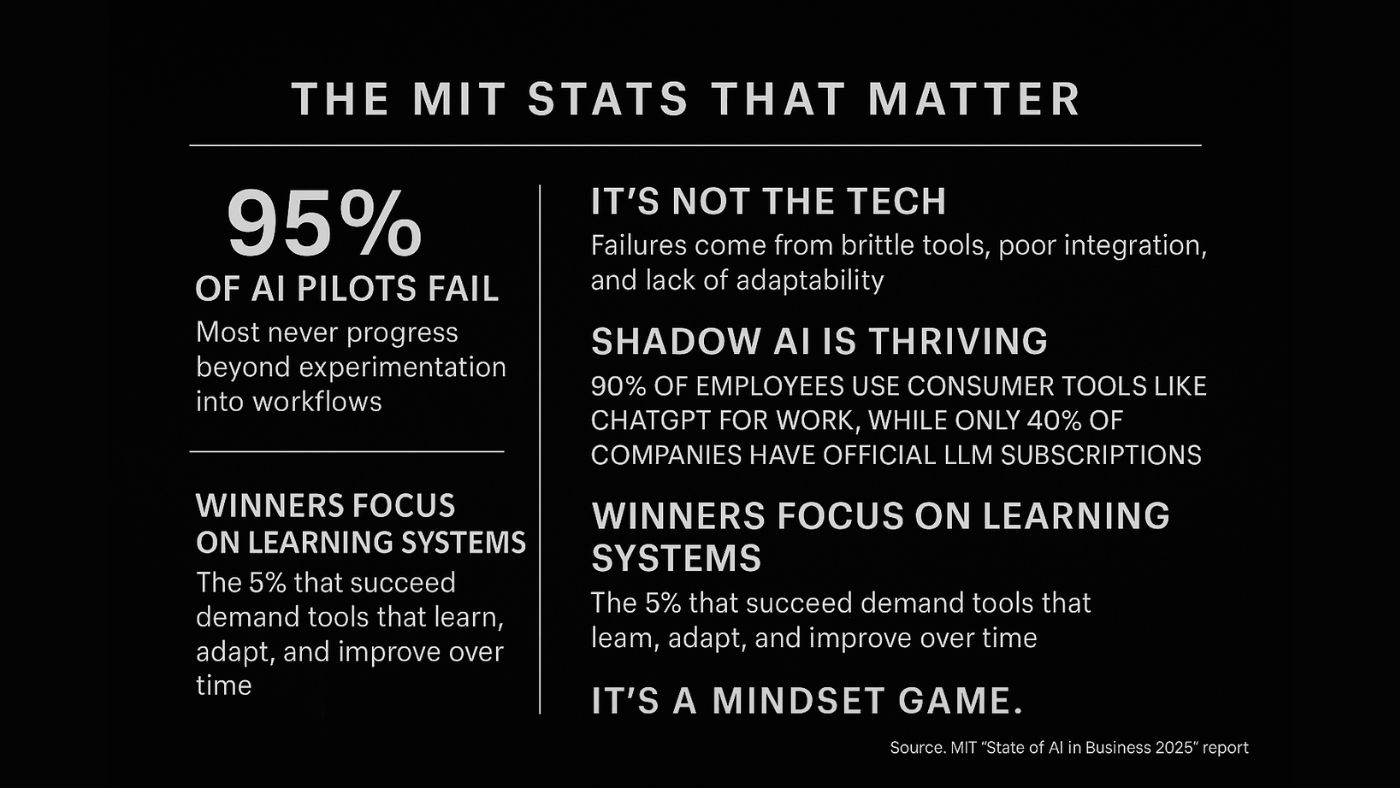Summary
Let’s get this straight: AI is not a young person’s game.
It’s a mindset game. And the sooner leaders wake up to that, the better.
I don’t care if you’re 25 or 55 — if you treat AI like a toy, you’ll get toy-sized results. If you treat it like the strategic engine it can be, you’ll change the game.
Press enter or click to view image in full size
Stop Confusing Speed With Strategy
Younger startups move fast, sure. They don’t have legacy systems or bloated processes slowing them down. That’s an advantage, but speed isn’t the same thing as impact.
I’ve seen 20-somethings crank out prompts and call it innovation. And I’ve seen seasoned leaders redesign workflows, rethink processes, and actually integrate AI into decision-making and revenue systems. Guess who creates lasting advantage?
And here’s the kicker: an MIT study found that 95% of AI pilots fail. Not because the models aren’t good enough. Not because companies didn’t hire enough twenty-somethings. They fail because leaders don’t adapt workflows, systems don’t learn, and organizations hesitate to experiment boldly enough.

Age Isn’t the Play — Adaptability Is
Here’s the truth: it’s not the number on your driver’s license that matters.
It’s how quickly you can adapt, stay curious, and turn ideas into execution.
Those are the traits that separate people who toy around with AI from those who actually use it to transform businesses. And those traits exist at every age.
We’ve Done This Before
This isn’t our first disruption cycle. Those of us who cut our teeth in the dot-com boom, the rise of SaaS, and the mobile revolution already lived through the chaos. We worked the 12-hour days. We built the playbooks.
The so-called “hustle culture” didn’t start with Gen Z. We wrote the damn manual.
Why AI Feels Different (But Isn’t)
AI feels terrifying to some because it’s moving faster and louder than past shifts. But at its core? It’s still technology evolving to be a smarter assistant.
I’ve been leaning on technology as a partner since my first home PC in 8th grade. AI is just the upscaling of that assistant into what it always had the potential to be.
Yes, it’s messy. Yes, it hallucinates. But so do humans. The real edge comes from leaders who stop waiting for perfect and start experimenting now.
And let’s not overlook the shadow AI economy. MIT found that while most official pilots stall, employees everywhere are already using ChatGPT, Claude, and other tools in their day-to-day work — often more effectively than their company’s “formal” initiatives. That should tell us something: adaptability beats bureaucracy every single time.
The Winners Will Be Defined by Mindset
Companies that win with AI won’t be the ones with the youngest teams. They’ll be the ones with the boldest, most curious, most adaptable leaders — the ones who embed AI into the DNA of their business and never stop iterating.
Because the differentiator has never been age. It’s mindset. And if you’re still blaming the number on your driver’s license for your ability to innovate, you’re already behind.
My Final Word
So stop asking: “Do we have enough young people to keep up with AI?”
Start asking: “Are we adaptable enough to let AI change the way we work, think, and execute?”
That’s the real game. And it’s not age-bound. It’s leadership-bound.
Because yes, I said it and I stand by it:
The truth is, age isn’t the differentiator. Adaptability is. Curiosity is. The willingness to experiment and execute is.
Those traits aren’t tied to a birth year — they’re tied to mindset.
—Sterling

